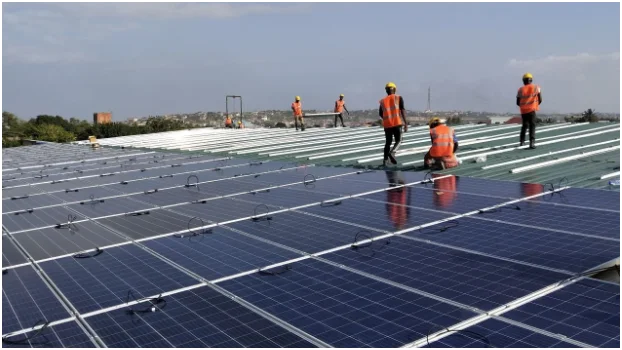Leading Solar Power Companies in Delhi Shaping India’s Green Fuel Future

India’s clean energy transition is accelerating rapidly, with solar renewable energy playing a pivotal role in this green revolution. As the nation strives to reduce its carbon footprint and meet ambitious climate targets, major cities like Delhi are emerging as critical hubs for renewable energy adoption. Renewable energy companies like Avaada are contributing deeply to this movement by delivering end-to-end solar and wind energy solutions, enabling a sustainable, low-carbon future for India while supporting energy security and industrial growth.
The Role of Solar Power in India’s Green Fuel Revolution
Solar energy is foundational to India’s Green Fuel Revolution, complementing green hydrogen, electric vehicle (EV) charging, and biofuel initiatives. By generating clean, renewable power, solar infrastructure supports the decarbonization of India’s industrial and residential sectors. This sustainable electricity supply not only reduces dependence on fossil fuels but also powers emerging green fuel technologies, accelerating India’s transition to a circular, green economy.
Why Delhi is Emerging as a Solar Power Hub
Delhi’s growth as a solar power hub is driven by supportive government incentives and rooftop solar policies tailored for the urban landscape. Incentives like net metering and subsidies encourage widespread adoption across residential and commercial rooftops. Urban demand for energy efficiency and clean alternative fuels invests in local solar manufacturing and project development. Increased capital inflows into Delhi’s solar sector highlight its role as a microcosm of India’s broader renewable energy expansion.
Key Segments Driving Delhi’s Solar Power Ecosystem
Residential Rooftop Solar Solutions
In Delhi’s urban and semi-urban areas, residential rooftop solar is witnessing significant growth. Consumers increasingly prefer smart inverters and low-maintenance solar units, supported by net metering frameworks, which reduce electricity bills and reliance on the grid. This trend is pronounced in gated communities and apartment complexes, reflecting rising environmental awareness and cost-saving measures among urban households.
Commercial & Industrial (C&I) Solar Installations
Delhi’s commercial and industrial sectors are rapidly embracing solar energy to reduce operating costs and achieve sustainability commitments. Large rooftop solar arrays on malls, hospitals, and warehouses contribute substantially to reducing carbon footprints. Solar power purchase agreements (PPAs) provide long-term stability in electricity costs, bolstering Delhi’s clean fuel shift.
Solar EPC & Turnkey Solution Providers
EPC firms deliver customized solar systems for diverse urban applications, ensuring quality installation and long-term system efficacy. Advanced technologies such as AI-based energy forecasting and automated maintenance models are increasingly implemented to optimise performance, safety, and serviceability.
Solar Product Innovators & Manufacturers
Innovation is central to Delhi’s solar growth, with local firms producing high-efficiency solar panels, batteries, and EV-ready solar devices. Compact systems adapted for space-constrained urban buildings, IoT energy management tools, and integrated smart meters enhance system usability. Solar renewable energy companies like Avaada exemplify this approach through integrated solar manufacturing operations that combine silicon-to-module production with advanced green fuels technologies.
Solar-Integrated EV & Green Fuel Solutions
The rise of solar-powered EV charging stations across Delhi NCR reflects the city’s commitment to clean mobility. Solar infrastructure integration with public and workplace charging hubs supports green hydrogen pilot projects and last-mile delivery systems, driving complementary advances in urban solar utilization. This synergy is key to Delhi’s sustainable transport future.
Community Solar Models & Shared Energy Platforms
Community-based solar projects, offering shared clean energy subscriptions, democratize access for renters and those without rooftop space. Such models mitigate installation costs and allow broader participation in the renewable energy ecosystem, fostering social equity and collective environmental responsibility.
Comparing Delhi’s Solar Growth with Other Cities
Delhi’s solar market growth parallels trends in other metro areas such as Mumbai, which also sees substantial investment in solar installations and renewable energy companies. However, Delhi’s focus on rooftop solar, local manufacturing innovation, and policy frameworks sets it apart. Mumbai’s solar expansion emphasizes large-scale projects and hybrid renewables, creating complementary regional contributions to India’s solar capacity.
Government Policies and Incentives Supporting Solar Power
Delhi’s solar energy adoption is buoyed by robust government policies, including subsidies, net-metering schemes, and streamlined approvals. Central government initiatives promote solar manufacturing and grid integration, providing a cohesive national-regional policy architecture that supports collaboration across cities like Delhi and Mumbai for broader renewable energy advancement.
The Role of Solar Power in Fueling Green Hydrogen and EV Growth
Solar energy underpins green hydrogen production efforts in Delhi NCR by powering electrolysis processes using renewable electricity. Integration with EV charging stations and clean fuel hubs creates a nexus of solar-powered green fuels that support India’s national hydrogen mission. Pilot projects demonstrate actionable progress in linking solar power generation with green hydrogen and electric mobility infrastructure, exemplifying technology convergence for a sustainable urban energy ecosystem.
Challenges and Opportunities for Solar Expansion in Delhi
Delhi’s solar expansion faces urban challenges like land scarcity, high upfront costs, and complex infrastructure integration. There are numerous opportunities in rooftop solar, community solar projects, and innovative floating solar technologies for water bodies. Financial innovations and policy reforms are vital to unlocking these opportunities, driving scalable, equitable solar deployment across Delhi.
Future Outlook: Solar-Driven Green Fuel Ecosystem
Delhi is poised to become a model city for renewable energy adoption, using the expertise and scale of solar power companies to meet India’s clean fuel goals. As companies like Avaada expand operational capacity and deploy future-ready solutions, such as hybrid wind-solar projects and green hydrogen production facilities, Delhi’s urban renewable energy ecosystem will serve as a blueprint for nationwide clean energy integration. Synergistic collaborations with metros like Mumbai will amplify India’s green fuel future at scale.
Conclusion
Delhi’s leadership in shaping India’s green fuel future through solar power is clear and growing. Continued investment in solar renewable energy technology, backed by progressive urban policies and innovative business models, will be crucial to sustaining momentum. Every solar power company contributing to Delhi’s vibrant renewable ecosystem plays a vital role in India’s long-term clean energy mission, powering a sustainable, prosperous future for the nation.

Curtain Dry Cleaning and Leather Sofa Cleaning – Reliable Care by Duo Nini

Brian Ferdinand of EverForward Trading Joins Forbes Finance Council, Expanding His Voice on Markets and Risk

Get Any Company Objectives or News of rox.com

How Technology Is Changing Addiction Recovery in the Digital Age.

Our First Winter Trip to Aspen — And the Decision That Made It Stress-Free

How Technology Is Changing Addiction Recovery in the Digital Age.

Puzutask Com: Complete Guide, Reviews, and Login Information

Solve SMD Diodes Sourcing with Utsource's Bulk Options








